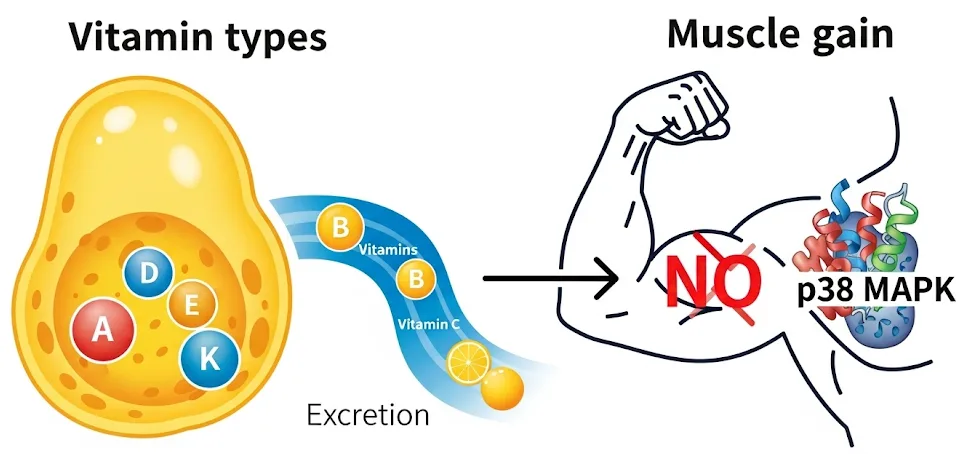Vitamins are a diverse group of organic compounds that are absolutely essential for the normal functioning of your cells, growth, and overall development. They play a vital role in countless bodily processes, and a lack of them can significantly increase your risk for various health problems, including heart disease, cancer, and osteoporosis (poor bone health).
Vitamins are broadly categorized into two main groups based on how they are absorbed and stored in your body: fat-soluble and water-soluble.
Fat-Soluble Vitamins
These vitamins—A, D, E, and K—are absorbed and stored in your body's fatty tissues and liver. They require dietary fat to be absorbed effectively. Because they can be stored for longer periods, consuming excessive amounts can lead to a toxic buildup.
Vitamin A (Retinol): This vitamin is crucial for maintaining healthy teeth, bones, soft tissue, mucous membranes, and skin. It's also vital for good vision, particularly in low light.
Vitamin D (The "Sunshine Vitamin"): Your body produces this vitamin when your skin is exposed to sunlight. Just 10 to 15 minutes of sun exposure a few times a week is often enough to meet your needs. Vitamin D's primary role is to help your body absorb calcium, which is necessary for strong bones and teeth. It also helps regulate blood levels of calcium and phosphorus.
Vitamin E (Tocopherol): A powerful antioxidant, Vitamin E helps protect your cells from damage. It also plays a key role in the formation of red blood cells and helps your body use Vitamin K.
Vitamin K: This vitamin is essential for blood coagulation (sticking together), a process vital for stopping bleeding from wounds. Some studies also suggest it plays a role in maintaining good bone health.
Water-Soluble Vitamins
This group includes all the B vitamins and Vitamin C. Unlike fat-soluble vitamins, they are not stored in the body in large amounts. Any excess is flushed out through your urine, so they need to be replenished regularly through your diet. The one exception is Vitamin B12, which can be stored in the liver for several years.
Vitamin C (Ascorbic Acid): A potent antioxidant, Vitamin C is crucial for healthy teeth and gums, wound healing, and maintaining healthy tissues. It also helps your body absorb iron.
Vitamin B1 (Thiamine): This vitamin helps your cells convert carbohydrates into energy. It is especially important for the proper function of your heart and nerve cells.
Vitamin B2 (Riboflavin): Working with other B vitamins, Riboflavin is important for body growth and the production of red blood cells.
Vitamin B3 (Niacin): Niacin helps maintain healthy skin and nerves. In higher doses, it can also have cholesterol-lowering effects.
Vitamin B5 (Pantothenic Acid): This vitamin is essential for the metabolism of food and plays a role in the production of hormones and cholesterol.
Vitamin B6 (Pyridoxine): Vitamin B6 is important for brain function and the formation of red blood cells. It plays a significant role in protein metabolism; the more protein you eat, the more Vitamin B6 your body requires.
Vitamin B7 (Biotin): Biotin is essential for the metabolism of proteins and carbohydrates and in the production of hormones and cholesterol.
Vitamin B9 (Folate or Folic Acid): Folate works with Vitamin B12 to form red blood cells and is needed for DNA production, which controls cell growth and function. It is particularly crucial for pregnant women, as low levels are linked to birth defects like spina bifida.
Vitamin B12 (Cyanocobalamin): Like the other B vitamins, B12 is important for metabolism. It also helps form red blood cells and maintain the central nervous system.
Choline: Often referred to as a "vitamin-like factor," Choline helps in the normal functioning of the brain and nervous system. A lack of choline can cause swelling in the liver.
The Interaction Between Vitamins and Muscle Growth
While vitamins are vital for overall health, some studies suggest that taking high doses of certain vitamins at specific times may have a negative impact on muscle growth.
Vitamins C and E: These two powerful antioxidants, when taken in high doses close to a workout, may inhibit muscle gain. The theory behind this is that the body's response to the micro-trauma caused by lifting weights—a process called cellular response to micro-trauma—is essential for muscle hypertrophy (growth). This response is partly mediated by a protein called p38 Mitogen-Activated Protein Kinase (p38 MAPK). Some research suggests that high doses of antioxidants like Vitamins C and E can dampen this process, thereby reducing the cellular response and potentially limiting muscle growth.
Timing: For this reason, it is often advised to take high-dose antioxidant supplements like Vitamin C and E 6-8 hours away from your workout. This allows the body to complete its natural inflammatory and cellular response to training. Some pre-workout supplements, which are designed to increase blood flow and muscle pump, may contain Vitamin C. It is recommended to check the ingredients of these products if you are concerned about this effect.
Steroid Users: The document notes that for individuals using anabolic steroids, this effect may be less of a concern. Steroids are highly anabolic and can override some of these natural cellular processes. However, it is still wise to be cautious and mindful of supplement timing.

